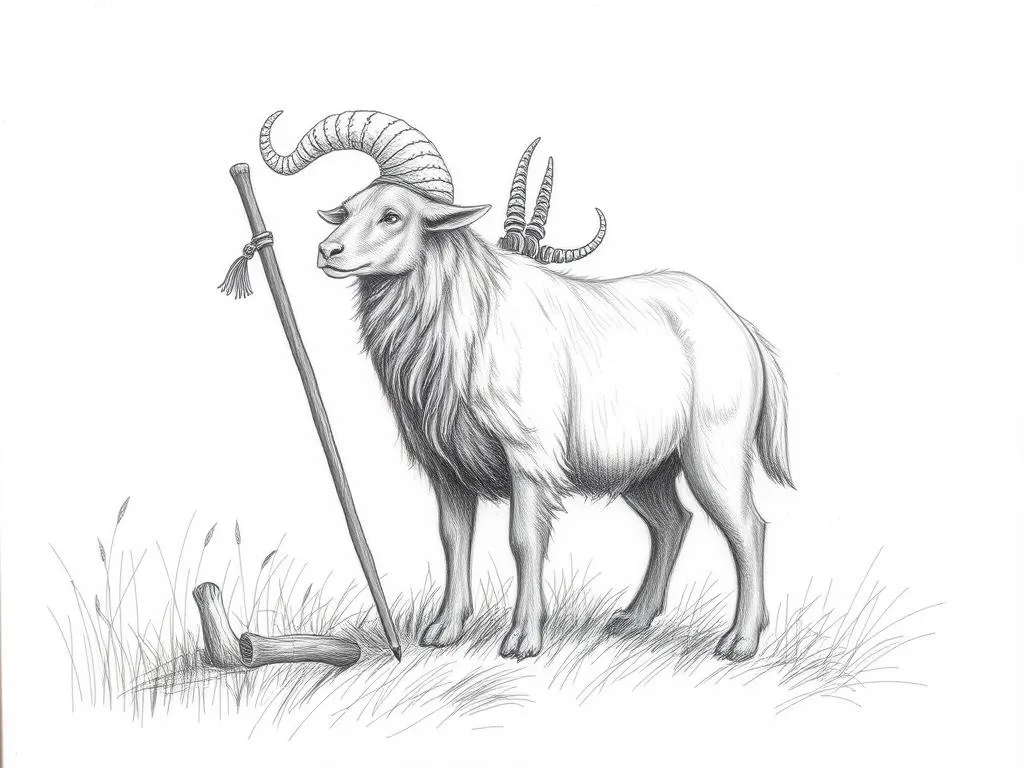The Shepherd: A Guide to Its Symbolism and Spiritual Significance

Disclaimer: Some images on this website are AI-generated artworks and may not accurately represent real animals.
The shepherd has long been a powerful symbol across various cultures and spiritual beliefs. From ancient times to modern interpretations, the shepherd’s symbolism and meaning resonate deeply with themes of care, guidance, and community. This blog post will explore the numerous dimensions of the shepherd, examining its historical significance, spiritual meanings, and the lessons we can learn from this timeless archetype.
Understanding the Shepherd
Historical Significance of Shepherds
Historically, shepherds have been essential figures in agrarian societies. They cared for sheep, a vital source of food, clothing, and trade. The shepherd’s role was not just limited to physical care; it also symbolized a deeper spiritual connection to nature and community. In many ancient cultures, shepherds were seen as the guardians of their flocks, embodying the principles of loyalty and sacrifice.
The Role of Shepherds in Different Cultures
Across various cultures, the shepherd has been depicted in religious texts, folklore, and art. In Christianity, for example, Jesus is often referred to as the “Good Shepherd,” symbolizing love, protection, and sacrifice for his followers. Similarly, in Islam, the role of a shepherd is associated with guidance and moral leadership. In many Indigenous cultures, the shepherd is seen as a mediator between the physical and spiritual worlds, nurturing the land and its inhabitants.
Characteristics of a Good Shepherd
A good shepherd embodies certain qualities that set them apart. These characteristics include:
| Characteristic | Description |
|---|---|
| Patience | A good shepherd must be patient, understanding the needs of their flock. |
| Courage | They face dangers and challenges to protect their sheep. |
| Compassion | A genuine care for the well-being of others is essential. |
| Wisdom | Good judgment is required to navigate difficult situations. |
| Leadership | They guide their flock, leading by example and inspiring trust. |
These traits not only define the physical role of a shepherd but also illustrate the deeper spiritual significance associated with this archetype.

Symbolism & Spiritual Meaning
Protection and Guidance
At its core, the shepherd symbolizes protection and guidance. Just as a shepherd leads their flock to safety, individuals often look for guidance in their lives. This symbolism reminds us of the importance of seeking mentors and leaders who can provide direction during turbulent times. The image of a shepherd watching over their sheep evokes feelings of safety and reassurance, representing the divine protection we seek in our spiritual journeys.
Nurturing and Care
The shepherd is also a symbol of nurturing and care. This nurturing aspect extends beyond physical needs, encompassing emotional and spiritual support. In many traditions, the shepherd represents the maternal instinct to protect and foster growth. This symbolism encourages us to cultivate compassion and empathy towards others, reminding us of our responsibility to care for those in our communities.
Community and Belonging
The role of a shepherd is inherently communal. A shepherd does not work in isolation; they are part of a broader ecosystem. The symbolism of the shepherd highlights the importance of community and belonging. Just as a shepherd tends to their flock, we are reminded of our connection to one another and the need to support each other in times of hardship. This communal aspect encourages us to build strong relationships and foster a sense of belonging.
The Shepherd as a Leader: Lessons of Responsibility
Leadership is another significant aspect of the shepherd’s symbolism and meaning. A good shepherd does not merely lead; they take responsibility for their flock’s well-being. This aspect of shepherding teaches us valuable lessons about accountability and moral leadership. In our own lives, we can draw inspiration from the shepherd’s example, striving to be responsible leaders in our communities, workplaces, and families.
Shepherds in Dreams
Common Themes and Interpretations
Dreams involving shepherds can carry various meanings, often reflecting our subconscious thoughts and feelings. Common themes associated with shepherd dreams include guidance, protection, and community. When a shepherd appears in a dream, it may signify a need for guidance in waking life or a desire for nurturing and support.
| Theme | Interpretation |
|---|---|
| Guidance | The dream may suggest that you are seeking direction or clarity in your life. |
| Protection | It could symbolize a need for safety or a desire to protect others. |
| Nurturing | The appearance of a shepherd may indicate a longing for emotional support or care. |
| Community | This may reflect feelings of belonging or a need for connection with others. |
The Shepherd as a Guide in Dream Scenarios
In many scenarios, the shepherd in dreams serves as a guide. They may lead you through challenging landscapes or provide comfort in times of uncertainty. This aspect emphasizes the role of guidance in our lives, encouraging us to seek out mentors or wise figures who can help us navigate life’s complexities. The shepherd’s presence can also signify a reassurance that you are not alone in your struggles.
Analyzing Emotions Associated with Shepherd Dreams
When interpreting dreams featuring a shepherd, it is essential to consider the emotions you experienced during the dream. Feelings of peace, safety, or joy may indicate a sense of comfort and support in your waking life. Conversely, feelings of anxiety or fear may suggest a need for guidance or protection that is currently lacking. Analyzing these emotions can provide valuable insights into your current state of mind and emotional well-being.
Modern Interpretations
Shepherds in Literature and Art
The shepherd continues to hold a significant place in literature and art. From pastoral poetry to contemporary novels, shepherds often symbolize innocence, simplicity, and the beauty of nature. Artists frequently depict shepherds tending to their flocks, creating a visual metaphor for care and guidance. This imagery serves as a reminder of the importance of nurturing our relationships with nature and one another.
The Shepherd Archetype in Pop Culture
In today’s pop culture, the shepherd archetype appears in various forms. Characters in books, films, and television shows often embody the qualities of a shepherd—courage, guidance, and leadership. These characters resonate with audiences because they reflect our innate desires for protection and community. Whether in heroic tales or everyday dramas, the shepherd archetype remains relevant, illustrating timeless lessons about human connection and responsibility.
The Spiritual Connection in Contemporary Life
In contemporary life, the shepherd’s symbolism and meaning can be seen in various spiritual practices. Many individuals turn to meditation, mindfulness, or community service as ways to embody the qualities of a shepherd. This spiritual connection encourages us to cultivate inner peace and extend compassion to others, fostering a sense of community and belonging. By embracing the shepherd within, we can lead more fulfilling and meaningful lives.
Key Takeaways
The symbolism of the shepherd provides timeless lessons that can be applied to our daily lives. Here are some key takeaways to consider:
- Protection and Guidance: Seek guidance from mentors and offer protection to those in need.
- Nurturing and Care: Cultivate compassion in your relationships, fostering emotional support.
- Community and Belonging: Build strong connections with others and create a sense of belonging.
- Leadership and Responsibility: Embrace accountability and strive to be a responsible leader in your community.
These lessons remind us of the importance of embodying shepherd-like qualities in our personal and professional lives.
Conclusion
The shepherd remains a powerful symbol, rich in meaning and significance. From historical roles to modern interpretations, the lessons of the shepherd continue to resonate in today’s world. By reflecting on the enduring symbolism of the shepherd, we are encouraged to embrace the qualities of protection, nurturing, and leadership within ourselves. In doing so, we can foster a sense of community and belonging, ultimately guiding ourselves and others toward a brighter, more compassionate future. Embrace the shepherd within, and let its wisdom illuminate your path.







